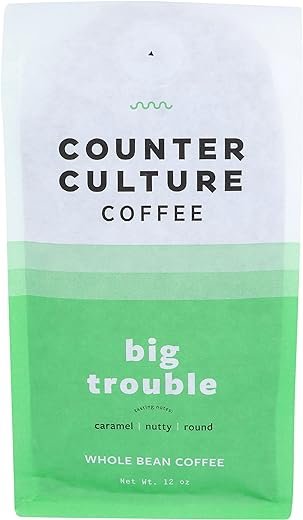In this comparison, I will delve into the distinct flavor profiles of Counter Culture’s Big Trouble and Organic Dark blends. By exploring their unique characteristics, brewing methods, and origins, we can uncover the nuances that set these two coffees apart. Let’s sip our way through an exploration of these two exceptional offerings.
Morning Boost
Bold Brew

Experience the bold and rich flavors of dark chocolate and smoky notes in every sip of our COUNTER CULTURE COFFEE dark roast Whole Bean Organic Number 46. Elevate your coffee game with this full-bodied blend, conveniently packaged in a square-bottom bag for freshness.
Counter Culture Big Trouble
Type of Coffee
Whole Bean Coffee
Tasting Notes
Caramel, Nutty, Round
Flavor Profile
Sweet and Mild
Packaging Dimensions
–
Bag Type
–
Counter Culture Organic Dark
Type of Coffee
Dark roast Whole Bean Organic
Tasting Notes
Dark Chocolate, Smoky, Full-Bodied
Flavor Profile
–
Packaging Dimensions
7.05 x 3.82 x 2.48 inches; 12 ounces
Bag Type
Square-Bottom Bag
Counter Culture Big Trouble
Counter Culture Organic Dark
Counter Culture Big Trouble
Counter Culture Organic Dark
Comparison chart


Big Trouble:
- USPs:
- Smooth and balanced flavor profile
- Suitable for various brewing methods
- Medium roast for a milder taste
- Pros:
- Versatile and easy to brew
- Great for everyday consumption
- Cons:
- Not organic
- Use-Cases:
- Ideal for those who prefer a medium roast coffee
Number 46:
- USPs:
- Dark roast for bold flavor
- Organic certification
- Single origin beans for unique taste
- Pros:
- Rich and intense flavor profile
- Organic and ethically sourced
- Cons:
- May be too strong for some
- Use-Cases:
- Perfect for those who enjoy a robust coffee experience
Conclusive Assessment:
- If you prefer a milder taste with versatility in brewing methods, Big Trouble is the recommended choice. On the other hand, for those seeking a bold and organic coffee experience, Number 46 would be the better option.
Final Summary:
Based on your preference for roast level and organic certification, choose Big Trouble for a smoother taste or Number 46 for a bolder, organic option. Both products offer distinct flavors catering to different coffee aficionados’ preferences.


Compare and Contrast: Coffee Culture Products
When choosing between different coffee culture products, it’s essential to consider various factors to find the perfect match for your preferences. Here are some general guidelines and key factors to keep in mind:
Roast Profile
- Counter Culture Big Trouble:
- Medium roast with balanced flavor notes.
- Counter Culture Organic Dark:
- Dark roast with bold and intense flavors.
Bean Origin
- Counter Culture Big Trouble:
- Blend of Central and South American beans.
- Counter Culture Organic Dark:
- Single-origin organic beans from South America.
Certification
- Counter Culture Big Trouble:
- Not organic certified.
- Counter Culture Organic Dark:
- Certified organic by USDA.
Flavor Profile
- Counter Culture Big Trouble:
- Bright acidity with hints of citrus and chocolate.
- Counter Culture Organic Dark:
- Rich and full-bodied with smoky undertones.
Sustainability
- Counter Culture Big Trouble:
- Commitment to direct trade relationships with farmers.
- Counter Culture Organic Dark:
- Emphasis on organic farming practices and environmental sustainability.
Packaging
- Counter Culture Big Trouble:
- Resealable bag to maintain freshness.
- Counter Culture Organic Dark:
- Eco-friendly packaging made from recycled materials.
By comparing these key factors, you can make an informed decision based on your preferences for flavor, origin, sustainability, and more. Happy brewing!
Caffeine Queries
Counter Culture Big Trouble is a blend that offers a balanced flavor profile with notes of chocolate, caramel, and a hint of citrus. On the other hand, Counter Culture Organic Dark is a rich dark roast with bold flavors of dark chocolate, toasted nuts, and a smooth, full-bodied finish.
Certainly! For Counter Culture Big Trouble, I recommend using a medium-coarse grind size and a 1:16 coffee-to-water ratio. The brewing method can be a pour-over or drip machine with water temperature around 195-205°F. As for Counter Culture Organic Dark, a medium-fine grind size and a 1:15 coffee-to-water ratio work well. It’s best brewed using a French press or espresso machine with water temperature in the same range. Enjoy your delicious cups of coffee!
Coffee plays a significant role in various cultures around the world. For example, in Italy, coffee is a central part of daily life, with espresso being a popular choice. In Ethiopia, coffee ceremonies are a traditional social activity that symbolizes hospitality and community. In Japan, coffee is seen as a trendy and sophisticated beverage, with a growing interest in specialty coffee. These are just a few examples of how coffee is deeply intertwined with cultural practices and traditions globally.
The origins of coffee culture can be traced back to the 15th century in Ethiopia, where legend has it that a goat herder named Kaldi discovered the energizing effects of coffee beans after noticing his goats became lively and energetic after eating them. From Ethiopia, coffee spread to the Arabian Peninsula and eventually made its way to Europe, where coffeehouses became hubs of social activity and intellectual discourse. Today, coffee culture is celebrated worldwide for its rich history and diverse flavors, making it a beloved beverage enjoyed by millions every day.
Coffee culture has evolved significantly over time, with trends shifting from basic drip coffee to a focus on specialty and artisanal coffee. Consumers now appreciate the origin, processing methods, and unique flavors of coffee beans. Third-wave coffee shops prioritize quality sourcing, roasting techniques, and brewing methods, offering a more personalized coffee experience. This evolution has led to a greater demand for high-quality, sustainably sourced coffee like the products you mentioned from Counter Culture Coffee.
Coffee culture plays a significant role in shaping modern societal norms and trends. It serves as a social lubricant, bringing people together to bond, work, or simply relax. The coffee shop has become a popular meeting spot for business meetings, study sessions, and casual hangouts. Moreover, the rise of artisanal coffee shops has sparked an interest in coffee as a craft, leading to an increased focus on quality, sustainability, and ethical sourcing within the industry. This emphasis on quality and craftsmanship has influenced consumer preferences and behaviors, encouraging a shift towards supporting local businesses and seeking out unique, high-quality products like Counter Culture Coffee. The ritual of enjoying a cup of coffee has become intertwined with daily routines and lifestyle choices, reflecting a desire for connection, authenticity, and pleasure in today’s society.
Yes, Counter Culture Coffee’s Organic Dark roasts are certified organic by the USDA. This means the coffee beans are sourced and processed following strict organic standards. Additionally, Counter Culture Coffee places an emphasis on sustainable sourcing practices to support farmers and promote environmental responsibility.
Counter Culture Big Trouble is a medium roast coffee, while Counter Culture Organic Dark is a dark roast coffee. The Big Trouble blend offers a balanced and smooth flavor profile, while the Organic Dark blend provides a richer and bolder taste with darker notes. Both are excellent choices, catering to different preferences in roast levels.






